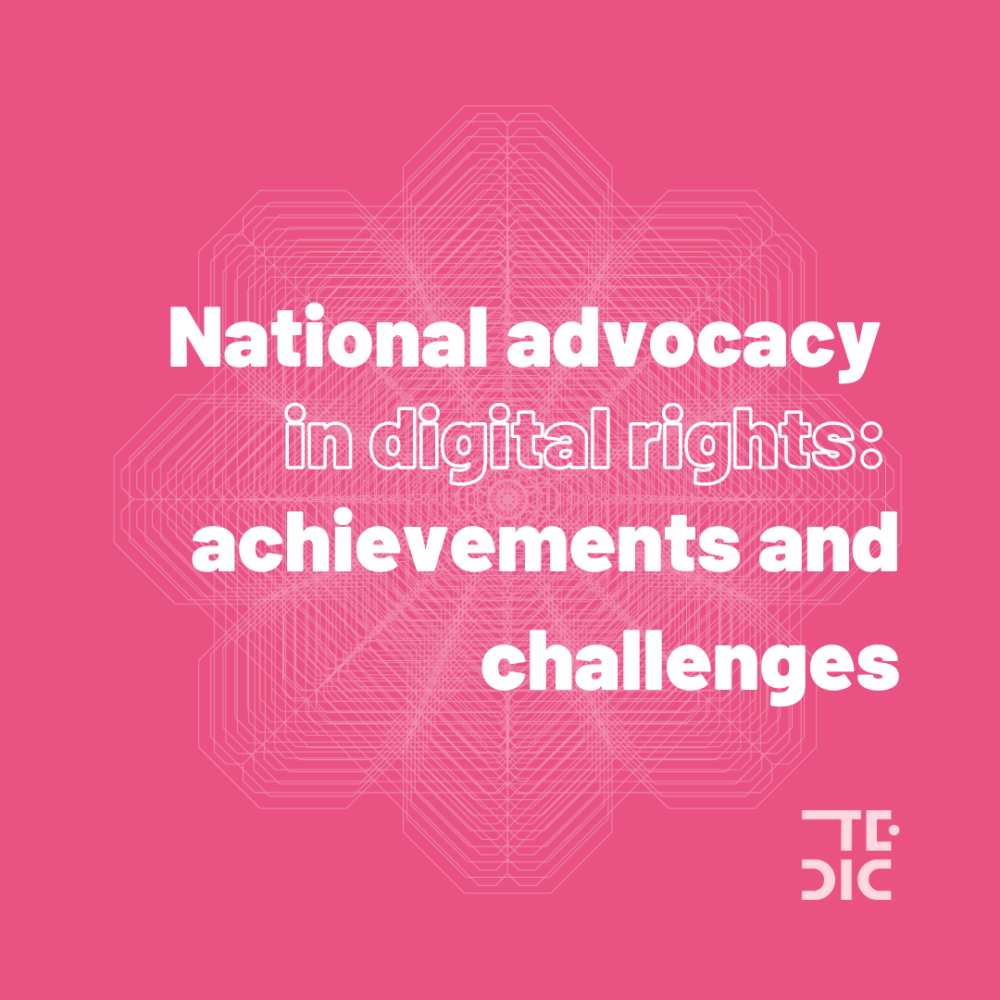
As the second half of 2024 progresses, TEDIC continues to work on the protection of human rights in digital environments, seeking to influence public policies that promote a more just and equitable society. Just like we did during the first term of the year, and despite the current difficulties, our commitment to national advocacy continues to strengthen. Throughout these last months, we worked on crucial issues for our country, such as privacy and personal data protection, the strengthening of our democracy, freedom of expression, and gender equality, always with a human rights perspective.
During this second half of the year, we carried out numerous activities that illustrate our mission to promote technologies and legislation that protect the fundamental rights of all individuals. In this blog, we present a summary of our advocacy actions between May and September 2024, structured in our main key areas of work.
Personal data and privacy: A continuous advance towards comprehensive legislation
During recent months, we have intensified our campaign for a Comprehensive Personal Data Protection Law in Paraguay. At the Personal Data Coalition, formed by TEDIC, APADIT, PUENTE and the Paraguay chapter of Internet Society Paraguay, we keep working collectively towards legislation that properly protects the rights of all individuals. This effort, ongoing for more than three years, has been marked by key moments that bring us closer to the sanction of this essential law for the country.
Latest version of the personal data bill in Paraguay: A collective and participative effort
In July 2024, hopes were high regarding the personal data protection bill moving forward in its legislative process; however, the reality has proven to be more complex than expected. In the last few months, there have been three attempts to discuss the bill: on August 7, September 3, and finally on September 24, when the risk of the bill being postponed indefinitely was greater than ever. The majority party in Congress, the Colorado Party, requested a postponement sine die, which could have put the law on hold indefinitely. However, thanks to the strong arguments from the opposition, we managed to limit the postponement to just 15 days, in order to continue with the analysis of the bill and keep the discussion on the legislative agenda.
The final version of the project is the result of a collaboration between the Science and Technology Commission of the Chamber of Deputies, the Ministry of Information and Communication Technologies (MITIC), the Presidency of the Republic, and various experts who contributed their knowledge. Although we were inspired by legislation from other regions, we ensured that the law is relevant to the local reality. We believe that Paraguay must have robust legislation that guarantees the rights of all people and promotes a safer digital environment. In addition, MITIC presented a new version of the law to be discussed in Congress, which is still pending analysis by the legislative commissions.
We know that personal data protection is a complex issue that requires extensive outreach. Therefore, we reiterate our commitment to promote this proposal and engage in dialogue with all stakeholders to ensure that the bill receives the attention it deserves.
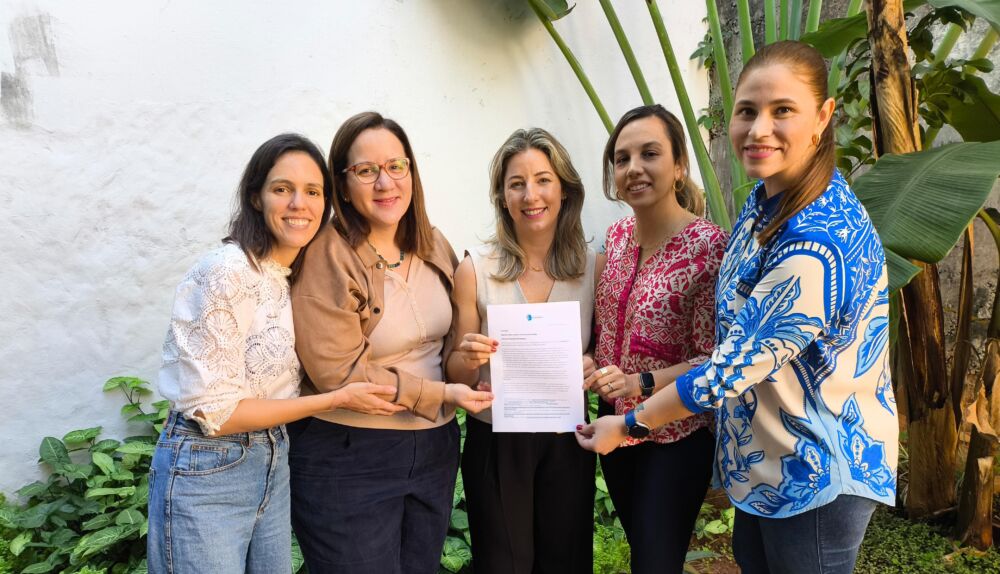
As part of our strategy to extend the conversation about personal data to all regions of the country, we held the “EmpoderDATA” event in Ciudad del Este. The discussion forum was a space for interested people, activists, academics and students to reflect on the importance of having a comprehensive data protection law. During the event, more than 60 participants discussed the risks associated with the misuse of data and the role that legislation plays in the protection of these rights.
This meeting not only raised awareness, but also allowed the creation of participatory messages on data protection, which were captured in a collective graffiti at the Universidad Nacional del Este (UNE). In this way, we connected data protection with people’s everyday experiences, raising awareness among more sectors of society about this issue.
In addition, in August, we held an important meeting with the National Competition Commission (CONACOM) to discuss the intersection between economic competition and personal data protection, presenting our research on personal data protection in the private sector in Paraguay. This discussion focused on analyzing how the misuse of personal data by companies affects both free competition and consumer rights. As a result, we planned a joint discussion forum that will take place in October, where we will seek to raise awareness among more stakeholders of the need for legislation that properly protects personal data in the economic and business context.
Between May and September, our actions focused on the promotion and expansion of the #MisDatosMisDerechos campaign, along with key collaborations that helped elevate this cause at the national level, achieving 24 appearances in different media1, including television, radio, print and digital press. We especially highlight our ongoing advocacy work for the sanction of the personal data protection bill, in collaboration with the Personal Data Coalition of Paraguay.
Traffic Data Retention: A Threat to Privacy
At TEDIC, we are deeply concerned about the implementation of regulations that allow the retention of traffic data without the proper legal guarantees, such as prior judicial authorization. Since 2014, with our Pyrawebs campaign, we have been reporting and warning about mass surveillance and the lack of a comprehensive personal data protection law, which aggravates the situation in Paraguay.
In 2022, the data conservation law, led by Deputy Rodrigo Blanco, included the obligation of Internet Service Providers (ISPs) to retain user traffic data for a minimum of 6 months, without mentioning clear mechanisms for legally accessing such data. This law is currently in the same legislative process as the Personal Data Protection Law, and was postponed to be reviewed together with the latter in 15 days from September 24, 2024.
The concerns are increased due to the recent resolution of CONATEL, which requires all ISPs in Paraguay to retain this data without establishing clear procedures for accessing the information, such as obtaining a court order. In a context where we still do not have a comprehensive personal data protection law, this measure leaves citizens vulnerable to possible abuses and lack of control over access to data.
At TEDIC, we will continue to monitor this process and work to ensure that any regulations related to data retention respect people’s rights and guarantee their privacy.
Democracy: Strengthening citizen participation in the digital age
Strengthening democracy in Paraguay is a constant priority in our advocacy agenda. During the second half of 2024, we focused on the impact of technology on electoral processes, emphasizing the need for regulations and electoral reform that address the challenges of the digital age, grounded in empirical and scientific evidence. To achieve this, we worked together with experts, government representatives and other national organizations. Through research, meetings and workshops, we have influenced the public agenda to ensure fairer, more transparent and equitable processes.
Meeting with the Superior Court of Electoral Justice (TSJE)
We met with key representatives of the Superior Court of Electoral Justice (TSJE), including Luis Alberto Mauro, Carlos María Ljubetic and Christian Ruiz Díaz, to discuss electoral reform and challenges in regulating digital political propaganda. During the meeting, we shared our recent research on technology and elections, emphasizing the importance of greater transparency in the use of personal data and social networks in political campaigns.
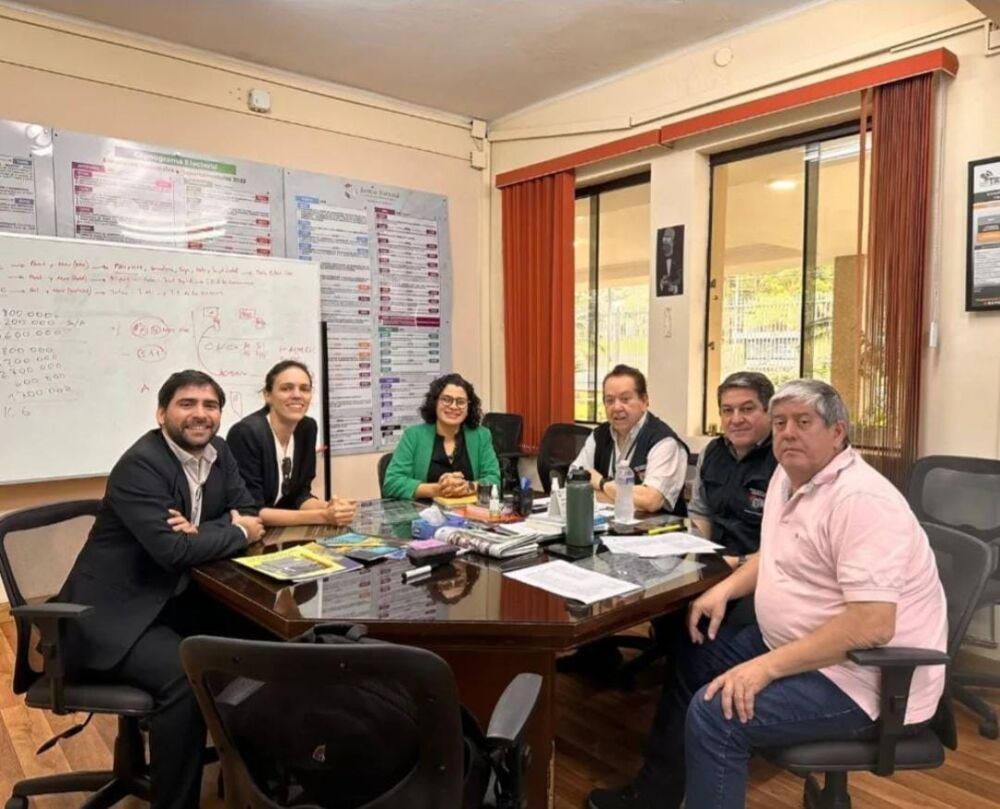
The TSJE informed us about its electoral reform proposal, which seeks to regulate digital propaganda processes and improve controls over online political financing. In this meeting, we also discussed the implementation of electronic voting, the use of biometric technologies and the regulation of electoral disinformation, highlighting the need for a balanced approach that does not compromise freedom of expression.
Following this meeting, Eduardo Carrillo, public policy analyst at TEDIC, made a detailed analysis of each of the proposals of the new electoral reform in Paraguay, presenting data from various research studies conducted at TEDIC within the framework of the series “Tecnología y elecciones”. From this meeting, we also consider it important to develop additional discussion spaces that would allow us to open the dialogue to more people. To this end, we created a series of debate and training spaces, including the following highlights:
The Influence Industry in Paraguay: Who is behind political financing on social media?
In a virtual event, together with Semillas para la Democracia and Tactical Tech, we presented the results of our research on the influence industry on Paraguay’s digital election campaigns. During the seminar, we discussed how political actors have used digital tools to manipulate public discourse in an obscure manner, and how these practices have affected transparency and trust in the electoral process.
During the 2021 and 2023 elections, the use of social media by candidates was characterized by the lack of regulations and the manipulation of personal data for political purposes. At this event, Eduardo Carrillo and Leonardo Gómez from TEDIC highlighted the urgent need to update electoral legislation, not only to regulate campaign financing on digital platforms, but also to protect the voters’ rights.
Workshop: Protection of Electoral Processes in the Informational Environment
In collaboration with International IDEA and with the support of the German Government, we participated in a workshop dedicated to protecting electoral processes in an increasingly digitalized information environment. In this space, we presented concrete proposals to reform the Paraguayan Electoral Code, focusing on improving the transparency of political financing and mitigating the risks of electoral disinformation.
Our approach included the proposal to create control mechanisms to regulate the use of technologies that collect biometric data in electoral campaigns, ensuring that the use of personal data does not lend itself to political manipulation, surveillance and a reduction of our privacy. This workshop was an opportunity to collaborate with other key actors and advance in the development of more inclusive and transparent policies.
Workshop: New electoral reform? Reflections and dilemmas about technology and elections in Paraguay
As part of our commitment to promote a more inclusive and transparent democracy, we organized this workshop in Ciudad del Este, in collaboration with the Graduate School of the Universidad Nacional del Este (UNE). During the workshop, we analyzed the main challenges facing the Paraguayan electoral system in the digital age, from the implementation of electronic voting to the impact of disinformation on voters.
In this space, we facilitated an open debate with students, academics and activists on the implications of technology in elections, exploring the challenges of the new electoral reform proposed by the TSJE.
Ñemongeta, a conversation about automatic registration to the Electoral Register and migrant vote abroad
This event, held in collaboration with the Coordinadora de la Migración Paraguaya (COMIPAR), focused on discussing the implications of Law 6951/22 on the automatic registration of Paraguayan voters abroad. In this discussion, we analyzed the limitations and challenges of implementing a secure and accessible migrant vote, considering both telematic voting and biometric technologies.
Together with representatives of migrant organizations in Argentina, Spain, the United States and France, we discussed how migrants can securely access their voting rights. We also raised the need to create a regulatory framework that guarantees transparency and security in voting for migrants, highlighting the importance of clear legislation that contemplates the use of new technologies without compromising the integrity of the process.
Virtual Forum: Virtual Crimes and Political Disinformation
In this forum, organized by the TSJE, we actively participated to discuss the challenges posed by political disinformation in the context of elections. During the event, Leonardo Gómez from TEDIC presented our research on the challenges of disinformation in electoral contexts.
In the forum, we addressed crucial topics such as lack of regulation on cybercrimes related to electoral processes, and how artificial intelligence is playing an increasingly significant role in spreading fake news. We highlighted the importance of implementing mechanisms to monitor and control digital propaganda, without compromising freedom of expression.
Panel Debate: Electoral Reform in progress, reflections and proposals
This panel debate was the closing event of our virtual course on technology and elections. We enrolled more than 60 people from all over the country in order to address the challenges facing the Paraguayan electoral system today. Held at UNIDA University and broadcast live for those who participated virtually, the panel brought together experts from various institutions, including representatives from the Superior Court of Electoral Justice (TSJE), International IDEA, Alma Cívica and national legislators.
During the panel, we discussed the main electoral reform proposals presented by the TSJE analyzing their viability and the repercussions they could have on the strengthening of democracy in Paraguay. TEDIC, represented by Mariela Cuevas, moderated the debate highlighting the need to include mechanisms that protect electoral transparency and guarantee the equitable participation of all sectors of society, with a particular focus on controlling digital financing and combating disinformation.
Our advocacy in the area of democracy, access to information and citizen participation also had a significant impact in the press, with 20 mentions in different media, including television, radio, print and digital. Among the highlights in this area, there was the dissemination of our research on the impact of social networks on electoral campaigns and the promotion of our virtual course on technology and election issues.
Freedom of expression: Defending the right to inform
The defense of freedom of expression is a fundamental pillar of our advocacy in recent months. In a context where journalists and communicators face increasing digital threats, at TEDIC, we have intensified our efforts to defend digital rights, emphasizing the protection of press freedom and the fight against disinformation in Paraguay. Our participation in high-level spaces and debates on media literacy have been essential to continue strengthening this fundamental right.
Human Rights Situation in Paraguay: Meeting with IACHR Commissioner
As part of our participation in the 54th OAS General Assembly, we had the opportunity to be part of the “Reunión sobre la Situación de los Derechos Humanos en Paraguay”, organized by the Inter-American Commission on Human Rights (IACHR). The meeting was held at the United Nations Information Center (UNIC), with the presence of prominent representatives of the IACHR, such as Commissioner José Luis Caballero, Rapporteur on Human Rights Defenders, Pedro Vaca, Rapporteur on Freedom of Expression, and Javier Palummo, Rapporteur on Economic, Social and Cultural Rights (DESCA).
During the meeting, TEDIC presented a speech focused on the current challenges Paraguay is facing in terms of digital rights and freedom of expression. We took the opportunity to deliver our research on the distortion of Law 5777/16 to rapporteur Pedro Vaca, highlighting the negative impacts that this interpretation has had on press freedom in the country. In our speech, we stressed the need to protect the rights of journalists and ensure a legal framework that does not unduly limit freedom of expression.
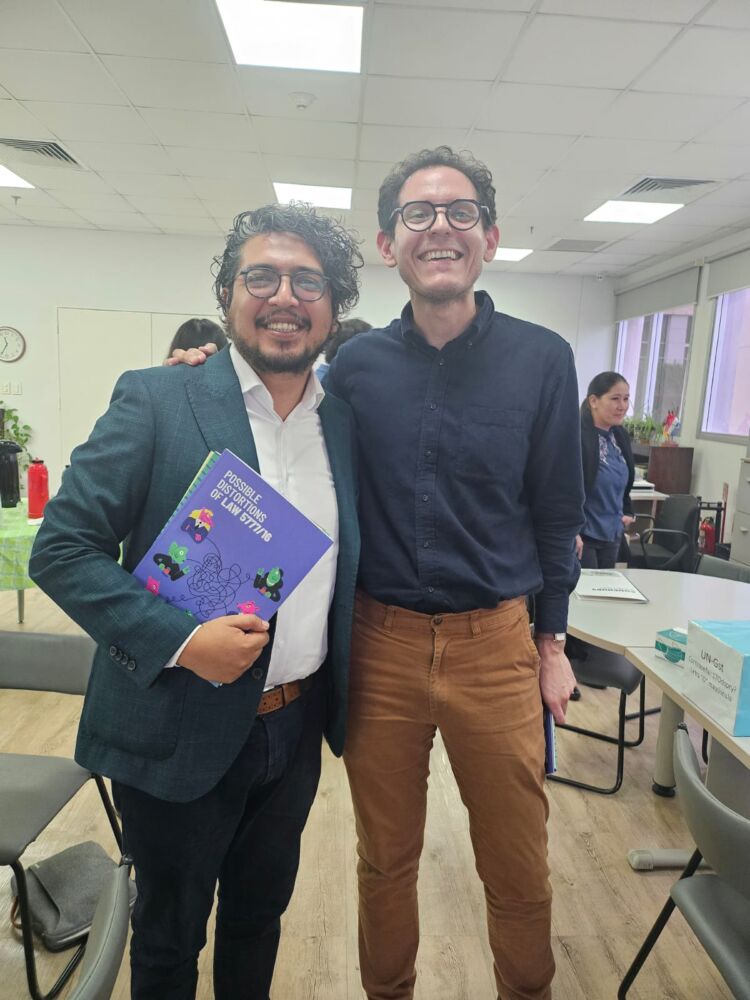
Panel: Disinformation and media literacy
Within the framework of Disinformation & Media Literacy Program 2.0, we participated in a panel discussion that addressed one of the most pressing issues for freedom of expression today: disinformation and media literacy. In this event, our executive director, Maricarmen Sequera, was joined by Desirée Esquivel, executive director from El Otro País, and Carson Villalba, executive director of the Centro Cultural Paraguayo Americano.
The panel focused on discussing strategies to combat disinformation and the spread of fake news, especially in electoral contexts, and how we can empower people to be critical consumers of information. Throughout the debate, examples were highlighted showing how media literacy can empower citizens to distinguish between reliable information and misinformation, thus contributing to a more informed and engaged society.
anel Debate: “The Future of freedom of expression in Latin America“
As part of our virtual course “S.O.S Periodista: Protección digital para periodistas frente a nuevas amenazas”, which enrolled more than 70 journalists from all over the country, we organized a panel debate in Asunción with the participation of experts from the country and the region. This was an opportunity to discuss the growing threats faced by journalists in an increasingly hostile digital environment, where disinformation and threats to their safety are a constant concern.
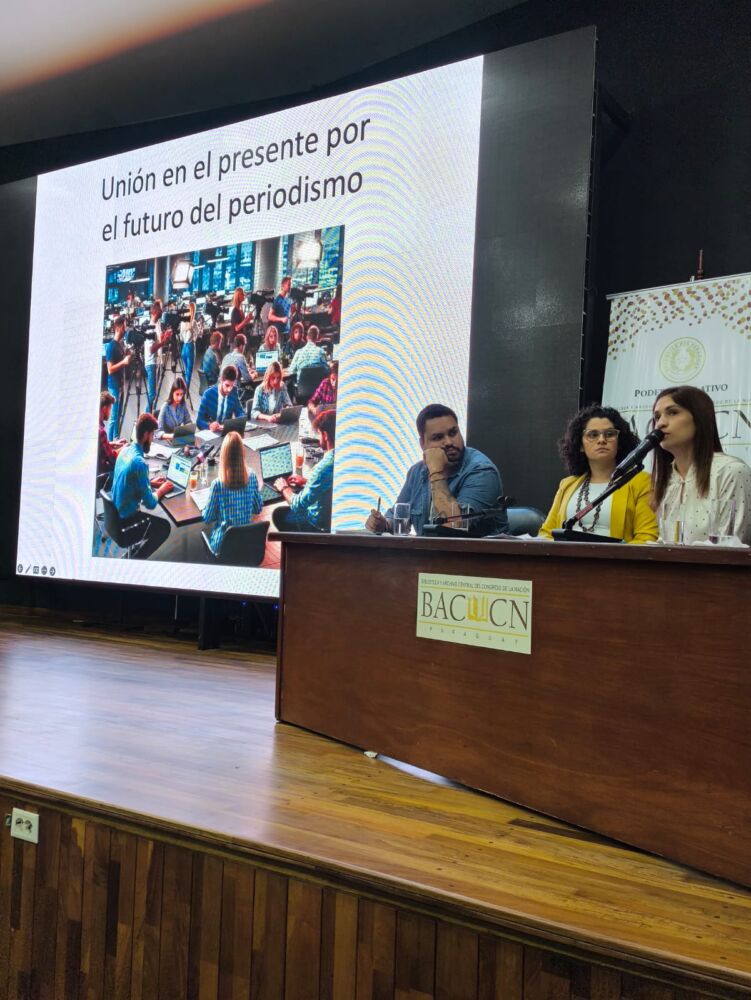
Panelists for this event included José María Costa, member of the Paraguayan journalists’ safety roundtable, Ruth Benítez from the Paraguayan Journalists’ Union and Juan Pablo Madrid-Malo from the Foundation for Press Freedom (FLIP).
Our advocacy in the area of freedom of expression also achieved a significant impact in the press, with 8 media appearances on the subject. We particularly highlight four interviews in four television channels with large audiences. In these interviews we managed to position crucial issues such as digital security in journalism, the importance of respecting the freedom of expression of journalists, the need for proper regulation of intermediaries and the importance of ensuring that law 5777/16 is not used to censor and limit the freedom of expression of journalists and communicators.
Gender: Towards an inclusive and equitable technology
Gender perspective is transversal to everything we do at TEDIC. Nevertheless, we seek to highlight specific activities that have a direct focus on creating a more inclusive and equitable digital environment for women and people from the TLGBIQ+ communities. These initiatives focus on advocacy spaces, regulations, workshops and research that promote technology that serves everyone, without perpetuating discrimination and inequality.
In this section, we share the most relevant actions carried out between May and September 2024, aimed at influencing the development of public policies and raising awareness about the importance of accessible and inclusive technology for all.
Discussion panel: Gender, Science, Feminisms and Social Research
Pamela Peralta and Lía Rodríguez represented TEDIC at the discussion panel organized by the Kuña Poty Feminist Association of Ciudad del Este. This event, part of the Gender and Science project supported by the Fondo de Mujeres del Sur, aimed to encourage regional scientific production from a feminist perspective, and to promote the creation of public policies based on scientific evidence. This space allowed for collaboration between the government, academia, and social organizations to develop strategies that integrate a gender perspective into science and technology. During the event, TEDIC shared its materials from the campaign “Mis Datos, Mis Derechos”, and initiated a dialogue on the need to address gender gaps in access to technology and the production of scientific knowledge.
Workshops on cyberbullying
Cyberbullying is a problem that particularly affects women and young people. At TEDIC we continue to work to conceptualize this issue as one of the types of violence facilitated by technology and we are committed to fighting against it. As part of this effort, we held two workshops in Coronel Oviedo and Villa Hayes, aimed at high school students. These spaces made it possible to raise awareness among young people about the dynamics of cyberbullying, provide them with tools to prevent it and encourage a responsible and safe use of digital technologies.
Through group dynamics and interactive activities, students learned to identify cases of digital harassment and shared their experiences, creating a safe space for dialogue.
Initiatives at the OAS Assembly: Fighting for gender equality
During the 54th OAS General Assembly, TEDIC actively participated in the initiative “OEA kuñanguéra roma’ẽ penderehe“, a coalition of more than 30 feminist organizations that joined their voices to demand greater commitment to defending the rights of women and the TLGBIQ+ community in Paraguay.
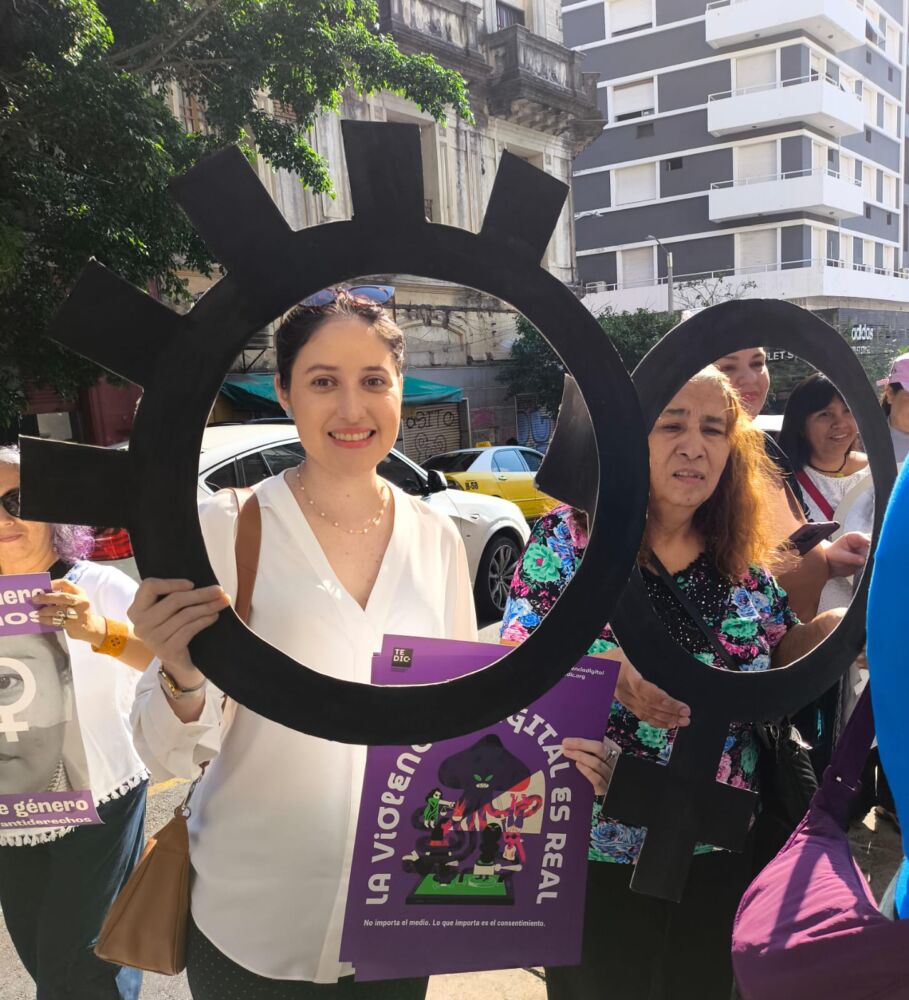
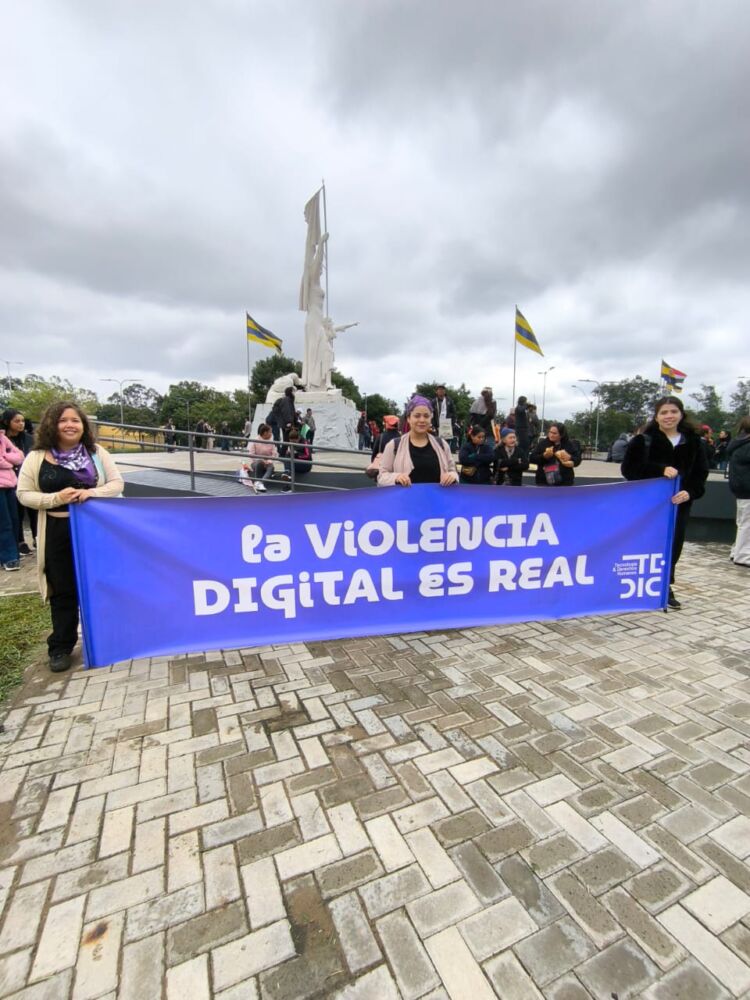
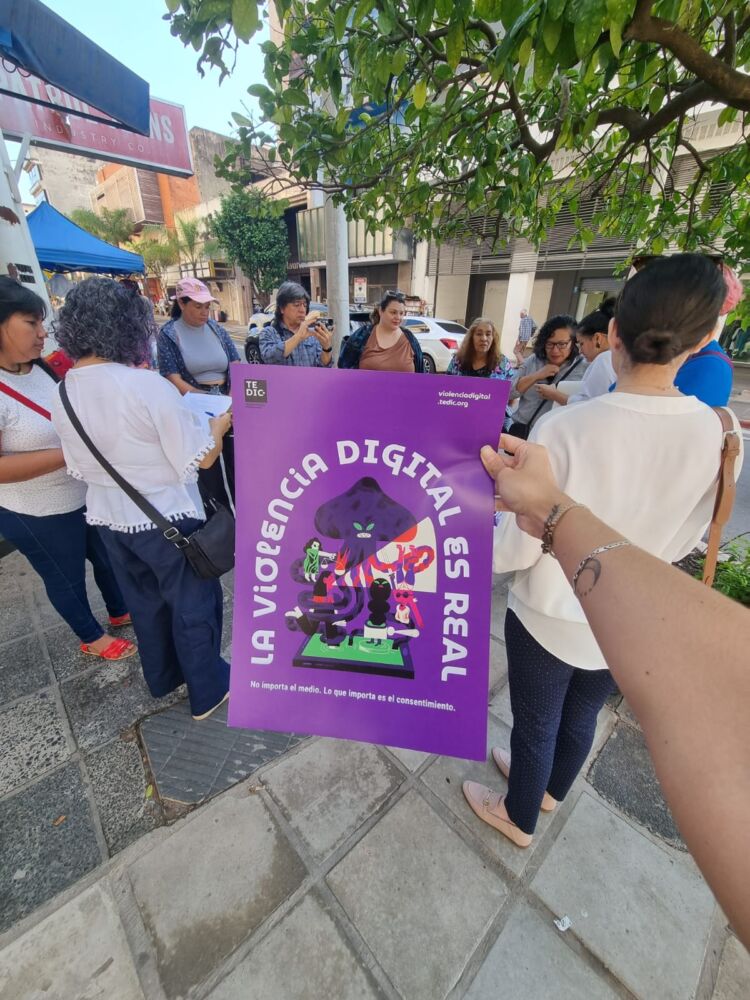
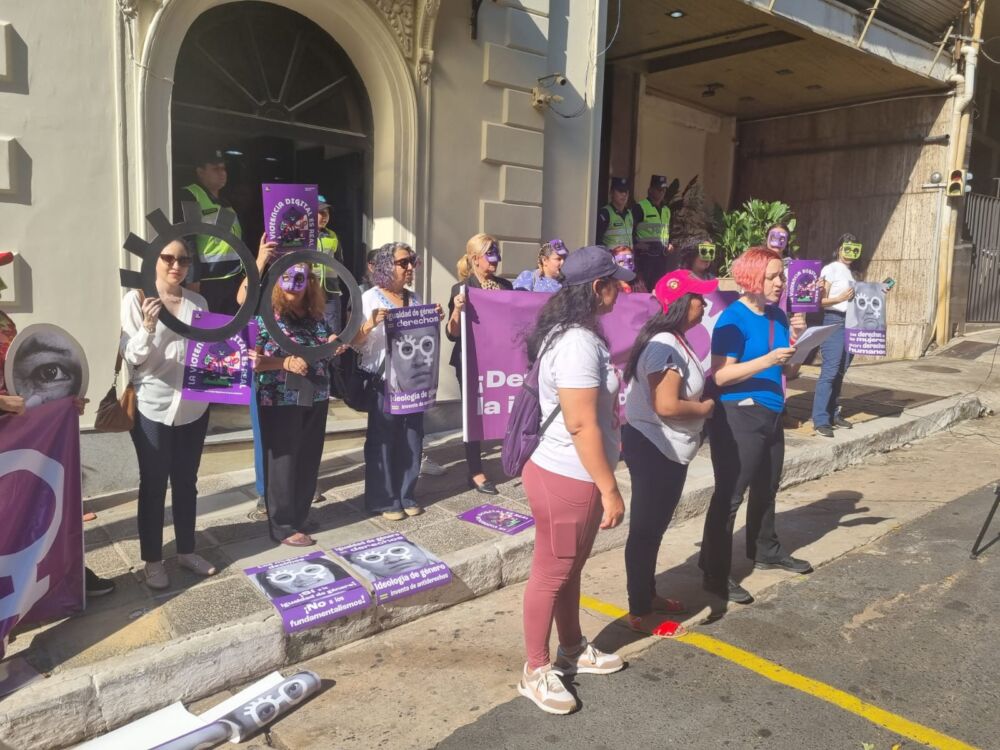
Among the highlights, we participated in an initiative aimed at the Ministry of Foreign Affairs, where we delivered a letter addressed to the Chancellor demanding the protection of women’s rights and making visible the fight against digital violence. We also participated in the General Assembly of Women and carried out our exhibition “Re(x)sistentes to digital dehumanization” in the framework of the Stop Killer Robots campaign, to raise awareness about the risks of artificial intelligence in autonomous weapons systems, and how these technologies can perpetuate discrimination and gender inequalities.
PREVIM Roundtable: Advances in the fight against online gender-based violence
At the regular session of the Inter-institutional Roundtable for the Prevention of Violence against Women (PREVIM), we presented two new research studies on gender-based violence facilitated by technology. The studies “De la teoría a la práctica: creación y puesta a prueba de un marco común para definiciones de violencia de género en línea” and “Perpetradores de violencia de género en línea: Hoja de ruta para investigaciones” were widely appreciated by the representatives of the Ministry of Women, National Police, Public Prosecutor’s Office and other institutions present.
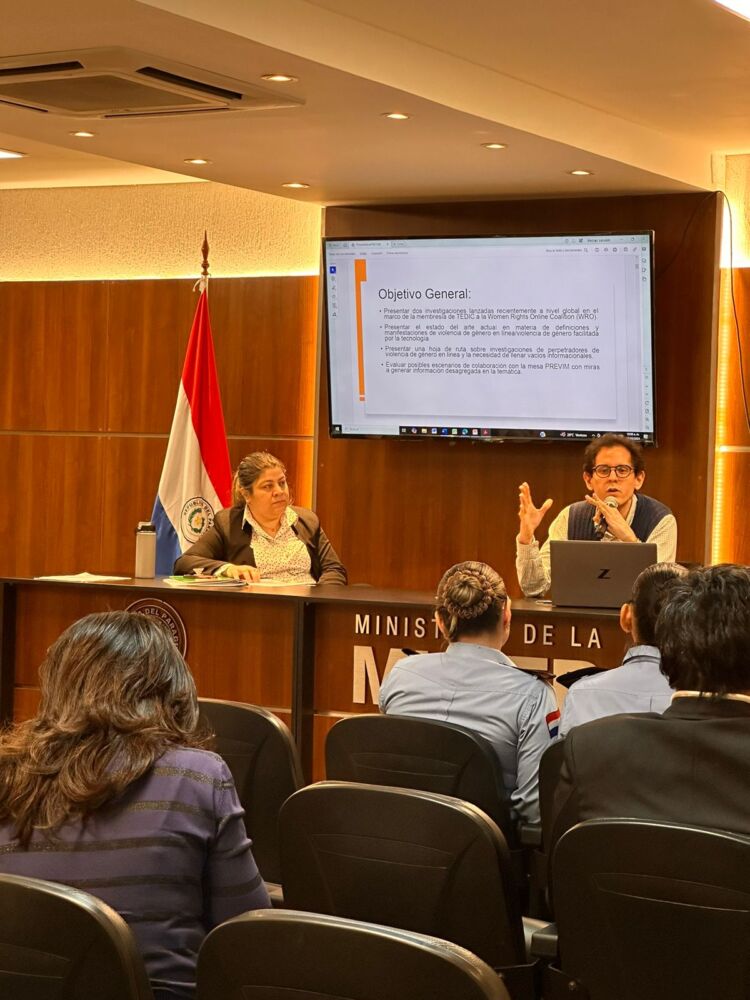
During the session, we discussed an educational manual about violence against indigenous women, and initiated a dialogue with the Training Institute of the Ministry of Women to develop a class to share our findings .
Digital security workshops for women’s organizations
As part of the Informadas y resilientes project, we conducted two digital security workshops for women ‘s organizations and human rights activists. In Asunción, we worked with organizations such as Sintradespy, CONAMURI, Casa de la Mujer, la Red de mujeres feministas de Paraguay and the Movimiento por la Salud de las Mujeres, while in Caaguazú we collaborated with the Asociación de Mujeres Campesinas y Populares (AMUCAP).
These workshops were intended to provide tools to strengthen the digital security of organizations and their members, addressing issues such as the protection of personal data, strategies to mitigate digital threats and the use of resources to improve online privacy. Both instances were fundamental to empower participants in a context where women human rights activists are particularly vulnerable to digital attacks.
Meeting with the OAS High Level Group for Strengthening Women’s Political Participation
During the visit of the OAS High Level Group, led by former Costa Rican President Laura Chinchilla, we had the opportunity to participate in key meetings to discuss women’s political participation in Paraguay. We presented the results of our research on how technology facilitated political violence against women candidates and explained the need to implement affirmative measures to promote equal opportunities in the political arena.

This event allowed us to share experiences and knowledge among various actors of civil society and the State, laying the foundations for future collaborations in the promotion of gender equality in Paraguayan politics.
Our advocay in the area of gender and digital inclusion also had repercussions in the press, with 5 mentions in the digital press and television. The main focus was on our advocacy within the framework of the OAS Assembly.
Future commitments
The second half of 2024 was a period of intense activity and significant achievements for our organization. We continue to advance our mission to protect human rights in digital environments and to advocate for public policies that promote a more just and inclusive society. As we approach the end of the year, we reaffirm our commitment to fighting for legislation that guarantees the protection of personal data, strengthens democracy, and promotes gender equality. Our goal is to ensure a safer digital future for everyone.
1 To access all our interviews you can visit our Youtube channel by following this link: https://www.youtube.com/@tedicpy


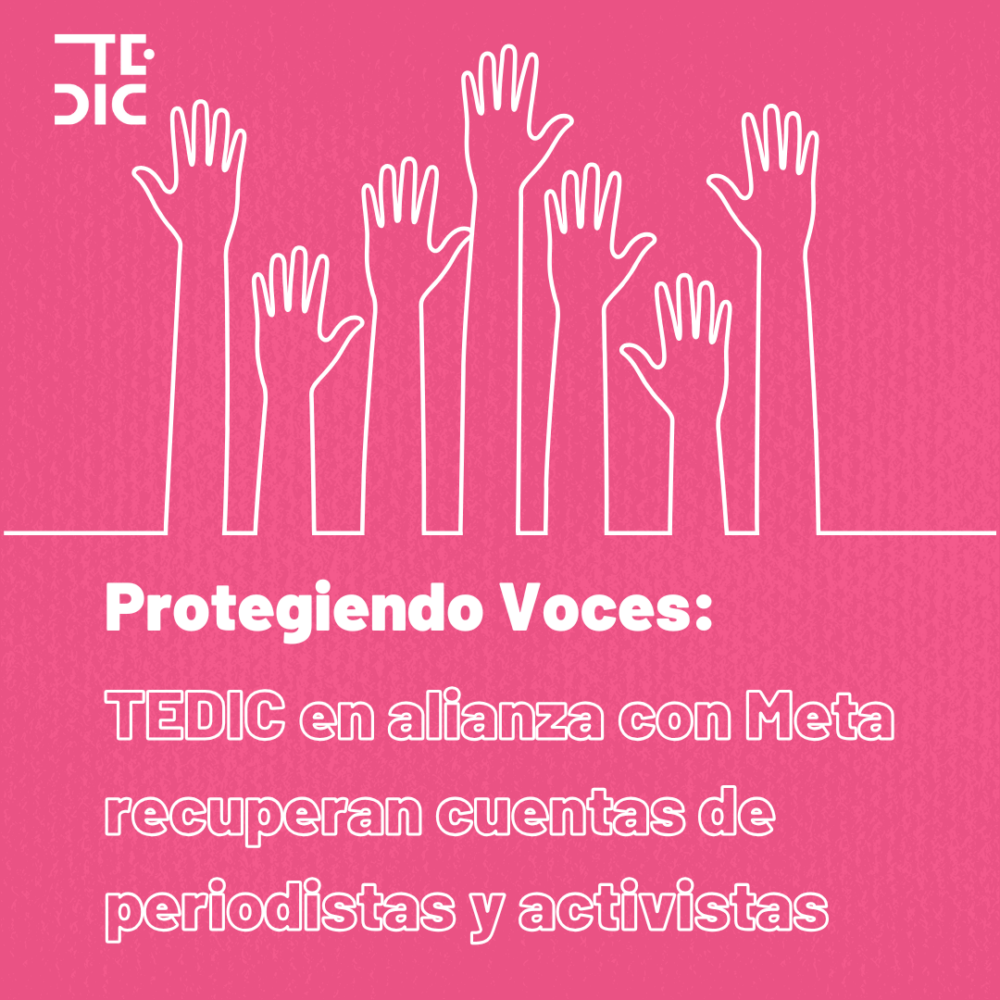 Defending those who defend us
Defending those who defend us  [Research] Technology-facilitated gender-based violence against women politicians in Paraguay
[Research] Technology-facilitated gender-based violence against women politicians in Paraguay